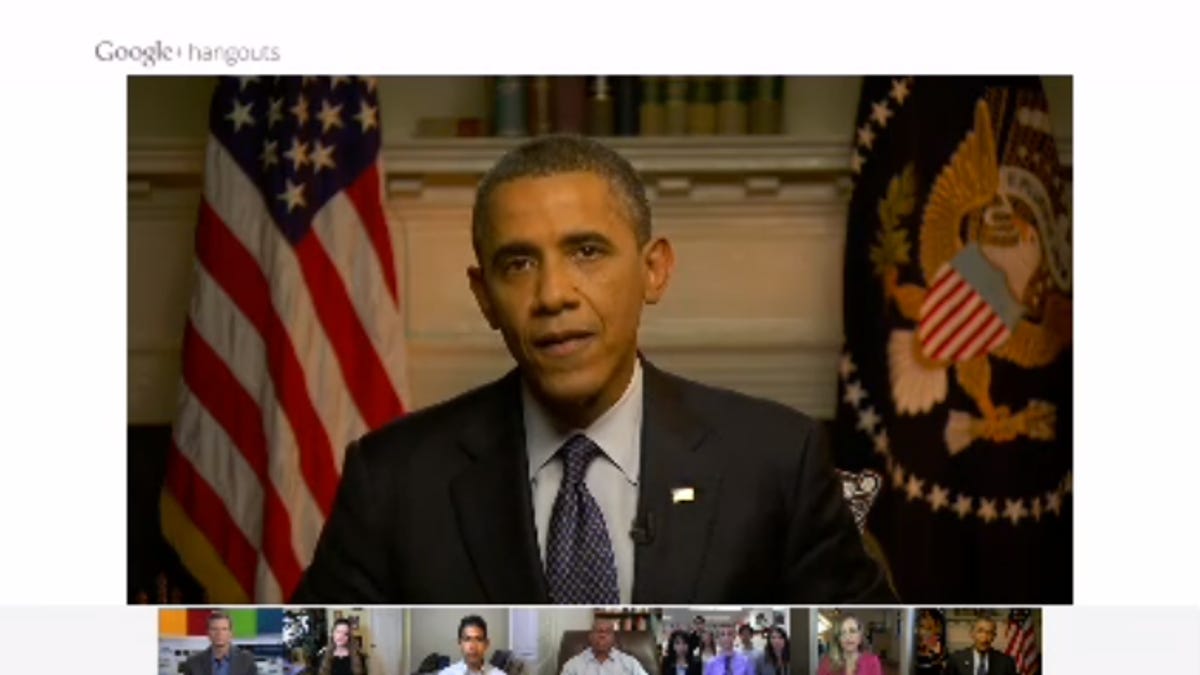Obama wants Hollywood, Silicon Valley to 'come together' on SOPA
During a Google+ hangout aired on YouTube, the president stops short of saying he opposes a pair of controversial Hollywood-backed copyright bills.
President Obama's first "virtual town hall" in 2009 took a legalize-pot detour. This afternoon, his first Google+ hangout with a handful of voters turned to a no less controversial topic: a pair of Hollywood-backed copyright bills.
In response to a question about whether the Stop Online Piracy Act and the Protect IP Act would levy "too much censorship on the Internet," the president stopped short of saying he opposes the legislation.
"I think that it's going to be possible for us" to find a workable approach, Obama said during the event broadcast on YouTube, predicting that it's possible to protect Hollywood's interests without "affecting the fundamental integrity of the Internet as an open, transparent system."
"What I've suggested is that both sides--the content side and the server side--come together and work with us to create a system where there are strong protections in place," and the Internet as an open and transparent system can also be protected, he said.
This has become a partisan issue: Republican presidential candidates, by contrast, have been far more critical of the controversial bills. During a debate this month, all four candidates denounced Protect IP and SOPA, and Rep. Ron Paul, the libertarian-leaning Texas Republican, publicly opposed SOPA long before nearly any other member of Congress did. Approximately three quarters of the supporters of Protect IP are Democrats.
This afternoon's video conference used the popular Google+ Hangout feature--which allows a multi-way video chat--to create a back-and-forth discussion among the president and the five people selected to join him. In addition, a few video questions submitted through YouTube were asked (approximately 135,000 questions total were submitted).
One of those questions asked: "Why are you personally supporting the extradition UK Citizen Richard O'Dwyer for solely linking to copyright infringing works using an Extradition Treaty designed to combat terrorism and to bring terrorists to Judgement in the USA?"
O'Dwyer is a U.K. student who the U.S. Department of Justice has been attempting to extradite to the U.S. to face criminal copyright charges (a BBC report this month says that the DOJ won the initial round in court). His alleged crime? Linking to copies of copyrighted films through TVShack.net, which has been seized by the Department of Homeland Security.
"I'm not personally doing anything," Obama replied. The "president doesn't get involved" in routine law enforcement matters, he said.
"What I can say broadly is that we want to make sure that intellectual property is protected" in a way that "works for everybody," he said.
SOPA and Protect IP, of course, represent the latest effort from the Motion Picture Association of America, the Recording Industry Association of America, and their allies to counter what they view as rampant piracy on the Internet, especially offshore Web sites. The bills would allow the Justice Department to obtain an order to be served on search engines, Internet service providers, and other companies, forcing them to make a suspected piratical Web site effectively vanish. They're opposed (PDF) by many Internet companies, users, and civil liberties groups.
Obama previously held a Twitter town hall event and showed up at Facebook last spring. A few months later, he visited LinkedIn's headquarters in Silicon Valley.
While this afternoon's event was a twist on the now-traditional town hall meeting, most of the topics remained largely the same: education, the economy, jobs, and foreign policy. (The usual pot-legalization question didn't, for once, come up.)
One difference was that unlike a physical town hall meeting, everyone had a microphone throughout the event. After Obama downplayed the significance of a New York Times article reporting that Iraqis are protesting "a small fleet of surveillance drones" patrolling Iraq's airspace even though U.S. troops have left the country, one participant wondered: "Do they send the message that the U.S. is interfering in other countries' affairs?"
Obama paused and retrenched. In general, he said, drones are a "targeted, focused effort at people who are on a list of active terrorists" and the program has "not caused a huge number of civilian casualties."
"This thing is kept on a very tight leash," he said.


